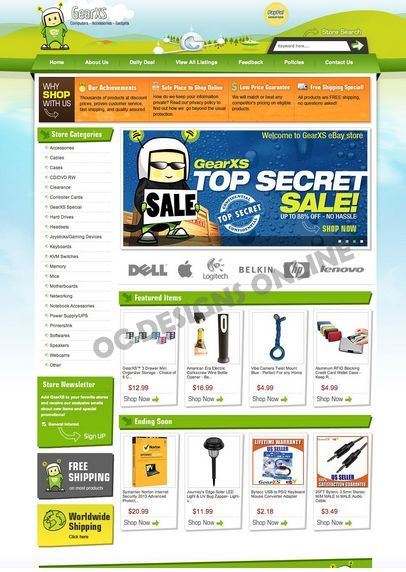 Whether you do your tax return on your own or have a bookkeeper or accountant prepare your return, with the year almost over, how much do you know about IRS rules for ecommerce retailers?
Whether you do your tax return on your own or have a bookkeeper or accountant prepare your return, with the year almost over, how much do you know about IRS rules for ecommerce retailers?
Making sense of Internal Revenue Service (IRS) publications can be tough! Most of them start out okay but then you get to sections where you have to determine this or that. We’ve all read those IRS scenarios—“To determine if you can qualify this as an expense, you must meet the following criteria….” and “you must also determine if you qualify for such and such.” It can be mind-blowing and trying to decipher IRS rules for ecommerce retailers including reading those lengthy publications is like reading a long novel—War and Peace for example.
Fear not ecommerce sellers, because here at OC Designs Online we’ve done some research to help you prepare well in advance for tax time!
Why New Rules?
According to the website Beyond415, which offers up all sorts of IRS rules for eBay sellers and other ecommerce stores, “Small businesses are among the largest contributors to the $450 billion a year tax gap, and as they increasingly do business online, the IRS has become more interested. In 2012, the IRS will continue a nationwide Compliance Initiative Project for emerging issues related to ecommerce.”
So what are those “emerging issues? Let’s take a look!
Yep, That’s Income!
IRS rules for ecommerce retailers include some items the IRS might look at so that means you need to keep accurate records. Some of these items include income from:
- Advertising
- Online tip jars where shoppers offer donation
- Referral fees and the sale of your customer lists
The IRS offers good information on recordkeeping and it’s a good idea to get familiar with how essential this is, especially if the bulk of your income comes from online sources.
Are You Prepared for the 1099-K?
Internet Business Law Services offers more information on IRS rules for ecommerce retailers including provisions included in the 2008 Foreclosure Prevention Act and those provisions went into effect in 2011 so it you’re not following them it’s time to! This one Act contains 260 pages but you can skip trying to find the provision that relates to online sellers and download the Act here and go to Section 3091 on Page 255.
Why are ecommerce sellers included in this Act? The purpose of Section 3091 of the Act is to “raise almost 10 billion over the next decade in tax revenue” according to Internet Business Law Services. That means since year-end 2011, ecommerce sellers are required to report all “gross receipts to the IRS” but there are some exceptions (see how confusing this can be?)
Essentially payment processors like PayPal as well as other payment vendors must now report to the IRS if a seller receives more than $10,000 per year so if you do go over that $10,000 in 2012, expect a 1099-K form from your payment processor. All 1099-K forms are sent to the IRS so you simply can’t ignore them and must include them when filing your tax return—and if you use more than one payment processing vendor, you’ll get more than on 1099-K. Specifically, the Act states that the rules apply to “Returns relating to payments made in settlement of credit and debit cards and third party network transactions.”
To learn more, here are links to the 1099-K form and the Instructions for the 1099-K form.
Should You Incorporate?
Many top sellers and eBay Power Sellers have already incorporated their businesses and have veered away from sole proprietorship. This may be something to consider and a good entity to utilize for you online business is a Limited Liability Company (LLC). LLCs are pass-through entities meaning owners of the company receive a K-1 known as the Shareholders Profit and Loss Statement.
LLCs are not taxed at the corporate level but at the partnership level so ecommerce retailers selling $10,000 or more in 2012 can take advantage of corporate business expenses including employee and operating expenses to help reduce the profit on K-1 statements. A Limited Liability Company generally allows for more business expense deductions including health and life insurance premiums as long as they are paid for by the company. Ask your CPA if incorporating is right for you.
If you are thinking an S-Corporation is right for your ecommerce business, keep in mind the IRS frowns on owners not paid as a 941 employee meaning at least one owner of the S-Corp must receive regular wages and be taxed the same as an employee on those wages. Not reporting any owner wages in an S-Corp is a big red flag to the IRS.
Other Compliance Issues
Beyond415 also offers up some “compliance tools” to aid you and these compliance tools will help if your ecommerce business is audited. All of these compliance tools are related to recordkeeping so it’s important to follow best practices when it comes to keeping records.
- Be sure to reconcile all merchant card payments including deposits to bank accounts.
- Make sure your financial books and records are continually updated.
- An IRS auditor will have the ability to view your “website traffic” to make a determination on just how high your sales volume really is—and they can also view historical data by analyzing your business at Archive.org to help determine ecommerce activity says Beyond451.
As the economy continues to recover the federal government will look for ways to increase income and one of those ways will be to ensure ecommerce retailers are following IRS rules. Some of the new IRS rules for ecommerce retailers will include auditing businesses for unreported income, income on appreciable assets, offshore activity and this includes selling outside of the U.S., abusing the home-office deduction and paying personal or family expenses from business accounts.
These are just a few items the IRS will be looking at very closely. Beyond451 is a great place to start or you can ask your store platform service such as eBay, Volusion or BigCommerce if they can lead you in the right direction on ecommerce IRS rules.
Above all, if you’re selling more than $10,000 per year, your payment processing service will report that income to the IRS, so if you’re not a whiz at filing a business tax return, enlist the aid of a professional—the fees for tax return preparation are tax deductible.
OC Designs Online wishes you a profitable year and we will continue to bring you updates to important issues that affect all ecommerce sellers!
Special Thanks to:
Beyond415 and Internet Business Law Services. Both Beyond415 and Internet Business Law Services offer tons of insights for ecommerce retailers through alerts and helpful articles and the minimal annual fees to join these organizations can also be deducted as a dues and subscriptions expense.








